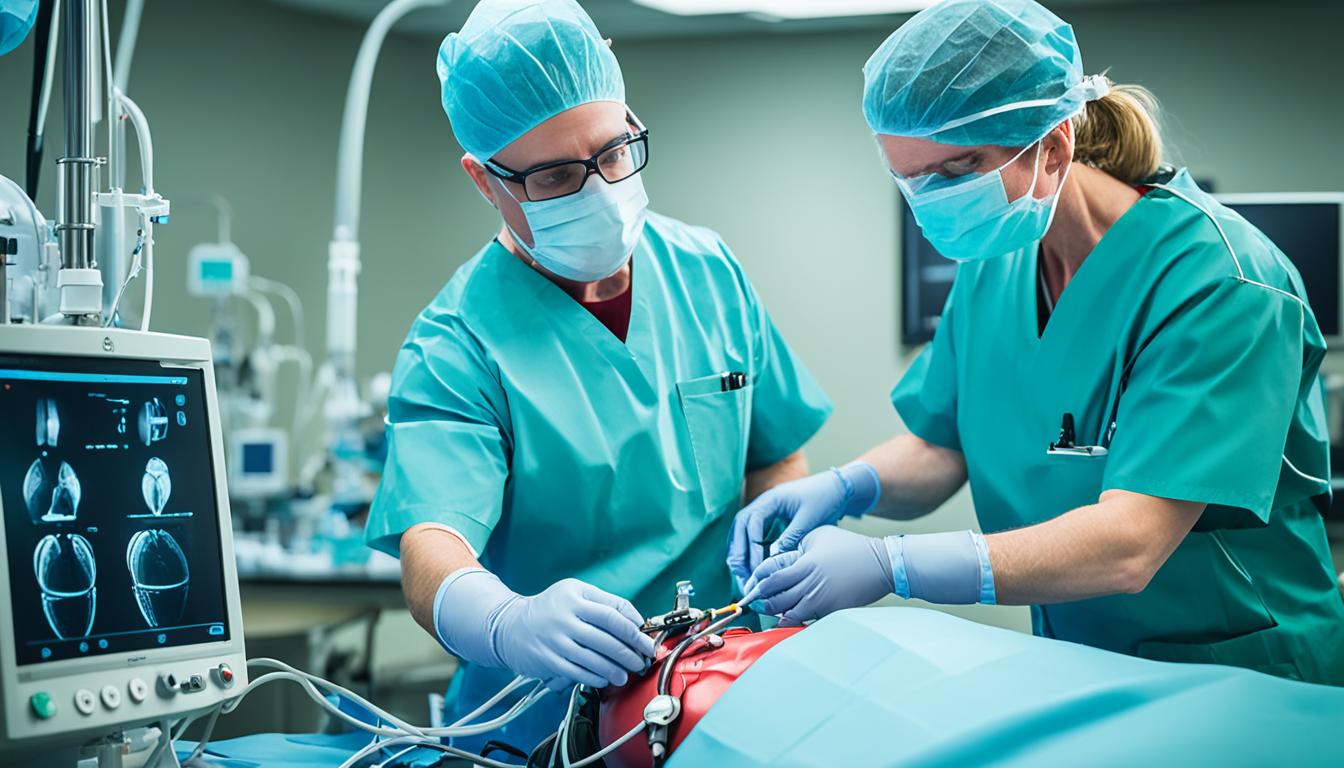Heart defects in adults are structural issues in the heart, present at birth. They might not show up until later in life. These issues can be with the heart’s chambers, valves, or blood vessels.
Adults with heart defects might feel short of breath, tired, or have swollen legs. They could also feel their heart beating irregularly. These signs can come from genetic reasons or things like diabetes. Medications or substances during pregnancy might also play a role.
It’s key for anyone with adult congenital heart disease to get regular check-ups. Monitoring the condition is vital to avoid complications.
Key Takeaways:
- Heart defects in adults, also known as adult congenital heart disease, are structural abnormalities in the heart present from birth.
- These defects can include malformations in the heart’s chambers, valves, or blood vessels.
- Common symptoms of heart defects in adults include shortness of breath, fatigue, swelling, and irregular heartbeats.
- Causes of heart defects in adults can include genetic factors, exposure to certain medications or substances during pregnancy, and medical conditions like diabetes or high blood pressure.
- Regular medical care and monitoring are essential for managing and preventing complications in individuals with adult congenital heart disease.
Diagnosis and Treatment Options for Adult Heart Defects
Diagnosing adult heart defects includes looking at the person’s past medical issues. Doctors also check the heart’s function and do some tests. These tests look for:
- Electrocardiogram (ECG): It checks the heart’s electrical work. It finds any bad rhythms or damage signs.
- Echocardiogram: Using ultrasound, this test shows a clear picture of the heart. It helps find problems with the heart’s parts.
- Cardiac catheterization: A tube goes into a blood vessel, reaching the heart. It checks blood pressure and finds more about the heart’s shape.
- Magnetic resonance imaging (MRI): This test uses magnets and radio waves to create heart images. It looks at the heart’s size, function, and issues.
Adult heart defect treatments depend on the issue’s seriousness. It also considers the person’s overall health. Treatments might involve:
- Lifestyle changes: A healthy heart life with exercise, good diet, no smoking, and limited drinking helps. It controls symptoms and boosts heart health.
- Medications: Drugs like diuretics and beta-blockers may help. Diuretics remove body fluids and beta-blockers manage heart rate and pressure.
- Surgery: Severe cases might need surgery. Procedures can repair or replace heart valves or correct heart issues. They help improve blood movement. Skilled surgeons and teams do these surgeries.
- Advanced therapies: Tackling complex issues, therapies like heart transplants might be options. Stem cell therapy is another innovative choice.
Working closely with heart specialists is crucial for those with heart defects. Specialists provide tailored advice, monitor the issue, and suggest the best treatments.
Advancements in Surgical Techniques
In the last few years, surgery for heart defects in adults has greatly improved. New methods mean less cutting, shorter hospital stays, and better results. Surgeons use less invasive ways, tools like robots, and small interventions to treat heart issues.
The Potential of Stem Cell Therapy for Adult Heart Defects
Stem cell therapy is showing promise for adult heart defects. It’s especially hopeful for those with heart failure or past heart attacks. Stem cells can become heart muscle cells, which might help rebuild the heart.
Many types of stem cells are being studied, including embryonic and adult stem cells. These studies aim to find ways to regenerate the heart. Research is ongoing to understand stem cell therapy’s full potential for heart issues in adults.
Results from tests on people show some promise. Heart function improved in some, reducing symptoms. But, there’s still much to learn about how well stem cell therapy works for heart diseases. It’s not available as a standard treatment yet.
For those who want to learn more about stem cell therapy, talking to a specialist in heart treatment is wise. These experts can check if stem cell therapy might work for your condition. They provide detailed information based on your health status. This helps in making the best choices for your heart health.
FAQ
Q: What are the symptoms of heart defects in adults?
A: Adults with heart defects might feel short of breath or tired often. They could also notice swelling in their legs and ankles or have a fast or irregular heartbeat.
Q: What are the possible causes of heart defects in adults?
A: Heart problems in adults can stem from genetics, certain medications, or issues during pregnancy. Health problems like diabetes or high blood pressure could also play a role.
Q: How are heart defects in adults diagnosed?
A: Doctors use several tests to diagnose heart defects in adults. This includes looking at your medical history, doing a physical check, and running tests like an ECG or MRI.
Q: What treatment options are available for adult heart defects?
A: The right treatment for adult heart defects depends on how serious the issue is and your health overall. It might involve changing your lifestyle, taking medicine, or having surgery.
Q: Is stem cell therapy a potential treatment option for adult heart defects?
A: Stem cell therapy is promising for adult heart defects, especially for those who’ve had a heart attack or heart failure. Studies show it can boost heart function and relieve symptoms.
Q: What types of stem cells are being used for cardiac regeneration in adult heart defects?
A: Scientists are looking at different kinds of stem cells for fixing adult heart defects. This includes embryonic, induced pluripotent, and adult stem cells.
Q: Is stem cell therapy widely available for the treatment of adult heart defects?
A: Currently, stem cell therapy is still being tested and isn’t widely used. If you’re interested, talking to a specialist in heart regeneration might be a good idea.

